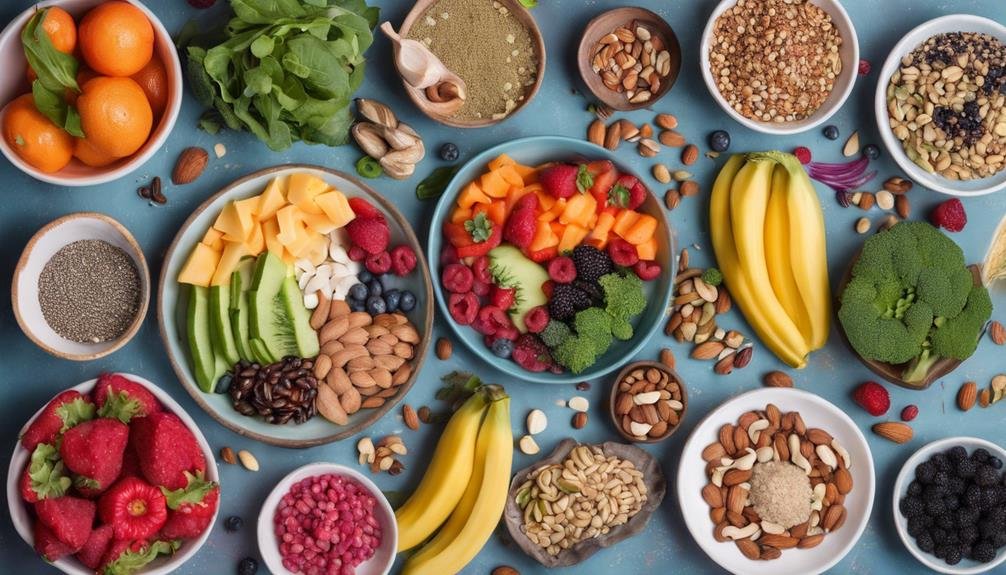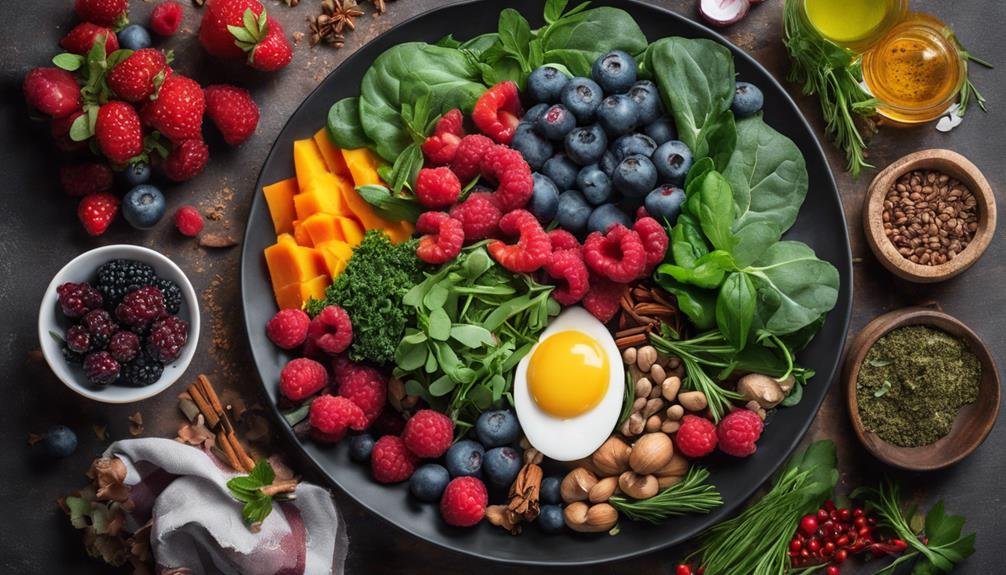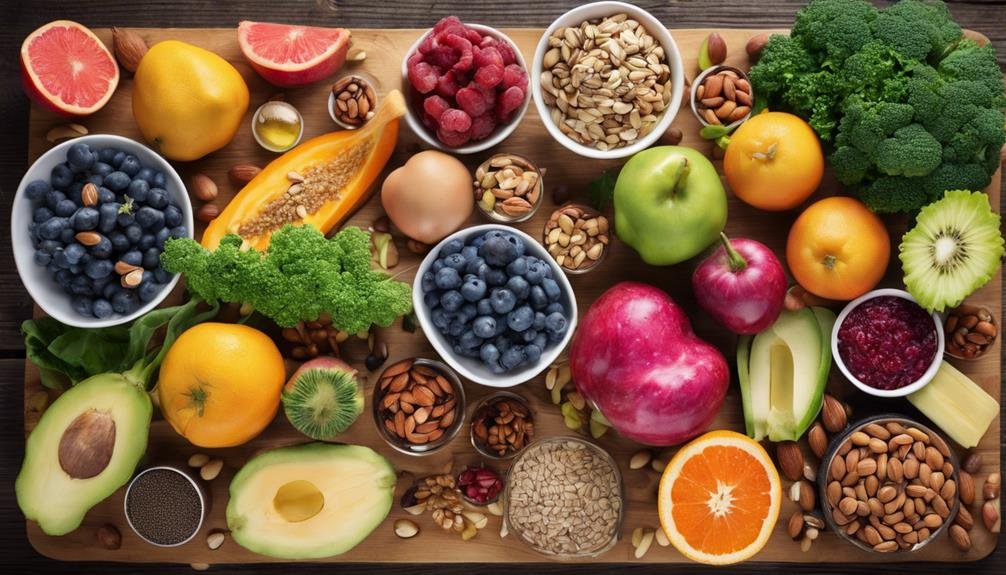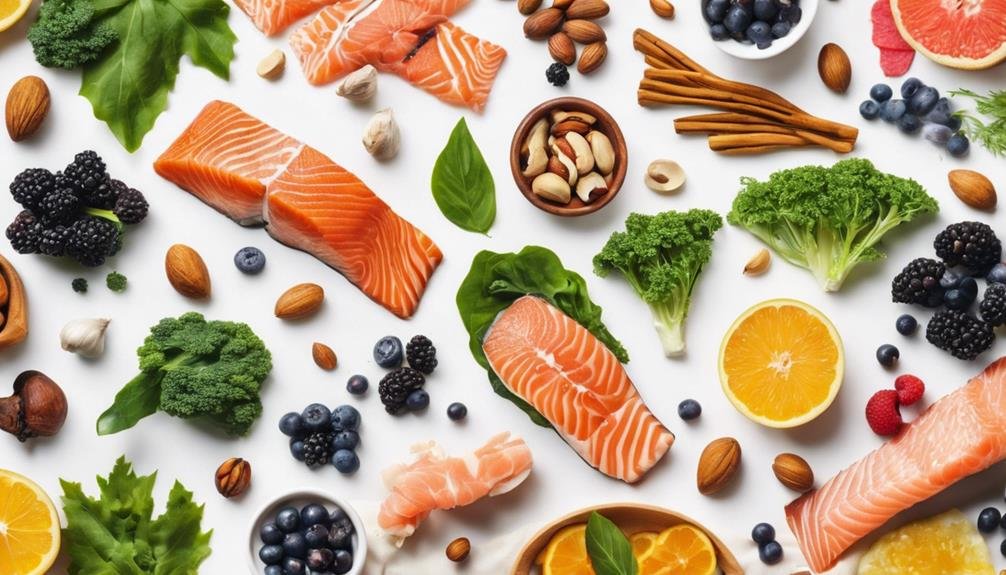When navigating the journey of cancer recovery, have you considered the impact of embracing Paleo principles on your healing process? The connection between nutrition and well-being is profound, especially when focusing on whole, nutrient-dense foods. By adopting a diet rich in lean proteins, fruits, vegetables, nuts, and seeds, you can create a supportive environment for your body's natural healing mechanisms. But how exactly do these Paleo principles contribute to your recovery journey? Let's explore the transformative power of food in your battle against cancer.
The Role of Nutrition in Recovery
Nutrition plays a crucial role in your recovery journey from cancer. Eating a balanced diet rich in nutrients can help support your body as it fights the disease and recovers from treatments. Ensuring you consume a variety of fruits, vegetables, lean proteins, and whole grains can provide your body with the necessary vitamins and minerals it needs to heal and regain strength.
Remember to stay hydrated by drinking plenty of water throughout the day. Proper hydration is essential for your body's functions and can also help alleviate some side effects of cancer treatments, such as fatigue and nausea.
Additionally, incorporating healthy fats like those found in avocados, nuts, and olive oil can provide you with a good source of energy and support overall health.
Benefits of Whole Foods
Have you ever considered the remarkable impact that whole foods can have on your journey to recovery from cancer? Whole foods, such as fruits, vegetables, nuts, seeds, lean proteins, and healthy fats, are packed with essential nutrients that can support your body during this challenging time. These nutrient-dense foods provide a wide range of vitamins, minerals, antioxidants, and phytochemicals that are crucial for boosting your immune system, reducing inflammation, and promoting overall wellness.
By incorporating whole foods into your diet, you can help your body repair damaged tissues, fight off harmful free radicals, and maintain energy levels to support your recovery process. Whole foods also offer a variety of flavors and textures, making your meals enjoyable and satisfying.
Additionally, choosing whole foods over processed options can help you avoid harmful additives, preservatives, and excessive sugars that may hinder your progress.
Eliminating Processed Sugars
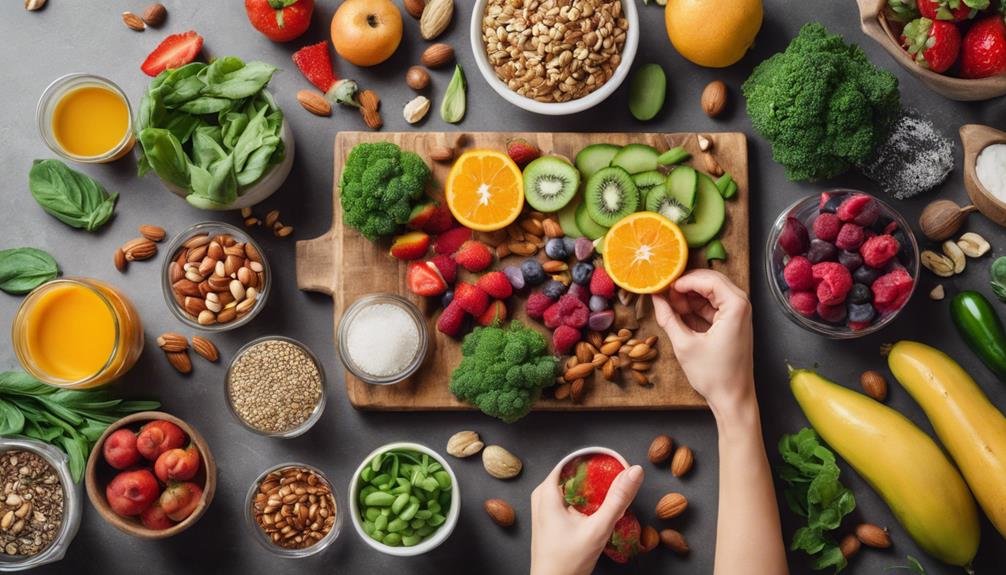
Considering the impact of whole foods on your cancer recovery journey, it's crucial to focus on eliminating processed sugars from your diet. Processed sugars, found in sugary beverages, desserts, and snacks, can contribute to inflammation in the body, which may hinder your recovery process. By cutting out these sugars, you can help create an environment in your body that's less conducive to cancer cell growth.
Processed sugars can also lead to spikes in blood sugar levels, which can impact your energy levels and overall well-being. Instead of relying on these empty calories, opt for natural sweeteners like honey or maple syrup in moderation.
Whole fruits can also provide a sweet fix while offering essential nutrients and fiber beneficial for your health.
Importance of Nutrient Density
Embracing a diet rich in nutrient-dense foods can play a pivotal role in supporting your journey towards cancer recovery. Nutrient density refers to the amount of essential nutrients in a food compared to the number of calories it provides. By choosing foods that are packed with vitamins, minerals, antioxidants, and phytochemicals, you're giving your body the tools it needs to heal and thrive.
Focusing on nutrient-dense foods such as leafy greens, colorful vegetables, fruits, nuts, seeds, lean proteins, and healthy fats can help support your immune system, aid in tissue repair, and provide energy during recovery.
These foods aren't only rich in essential nutrients but also often possess anti-inflammatory and antioxidant properties, which can help combat oxidative stress and support your body's natural healing processes.
Reducing Inflammation Through Diet
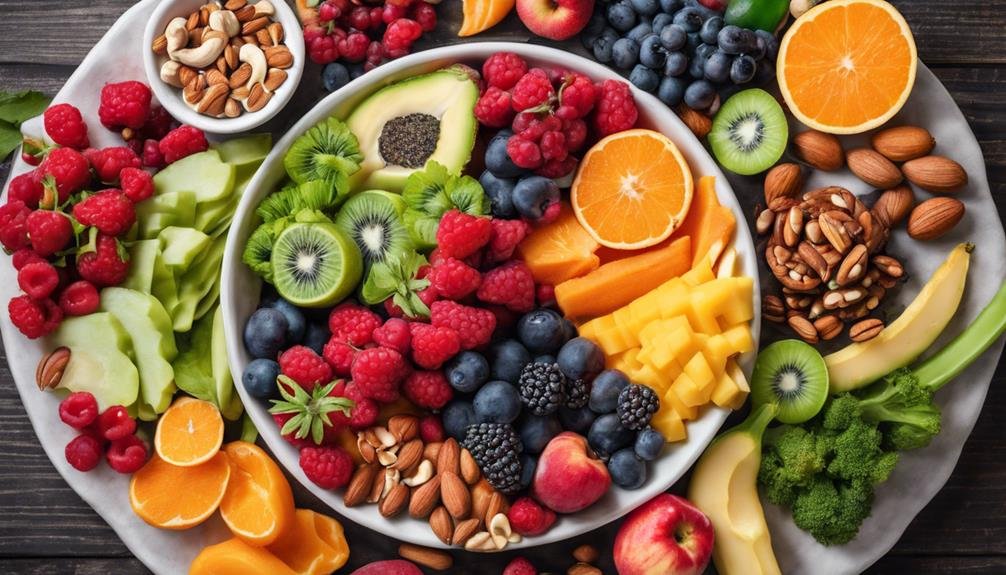
Wondering how you can decrease inflammation and support your body's healing process through diet? Making conscious food choices can play a significant role in reducing inflammation, which is crucial for supporting cancer recovery.
By following a Paleo-based diet rich in whole foods like fruits, vegetables, lean proteins, nuts, and seeds, you can help combat inflammation and provide your body with the nutrients it needs to heal.
Certain foods can trigger inflammation, such as processed sugars, refined grains, and unhealthy fats. By avoiding these inflammatory foods and focusing on whole, nutrient-dense options, you can create an environment in your body that promotes healing and recovery.
Incorporating anti-inflammatory foods like fatty fish, turmeric, ginger, and leafy greens can further support your efforts in reducing inflammation.
Supporting Immune Function
To continue supporting your body's healing journey and overall well-being, it's important to focus on bolstering your immune function. Your immune system plays a crucial role in fighting off infections and supporting your recovery from cancer. Following Paleo principles can provide your body with essential nutrients to enhance your immune function.
Including a variety of colorful fruits and vegetables in your diet can supply your body with antioxidants, vitamins, and minerals that support immune health. Opt for berries, citrus fruits, leafy greens, and cruciferous vegetables like broccoli and cauliflower. These foods are rich in nutrients that help regulate immune responses and protect your cells from damage.
Moreover, incorporating healthy fats like those found in avocados, nuts, and olive oil can also benefit your immune system. These fats contain omega-3 fatty acids and antioxidants that have anti-inflammatory properties, helping to reduce stress on your immune system. By nourishing your body with nutrient-dense foods, you can strengthen your immune function and support your journey towards recovery.
Lean Proteins for Strength
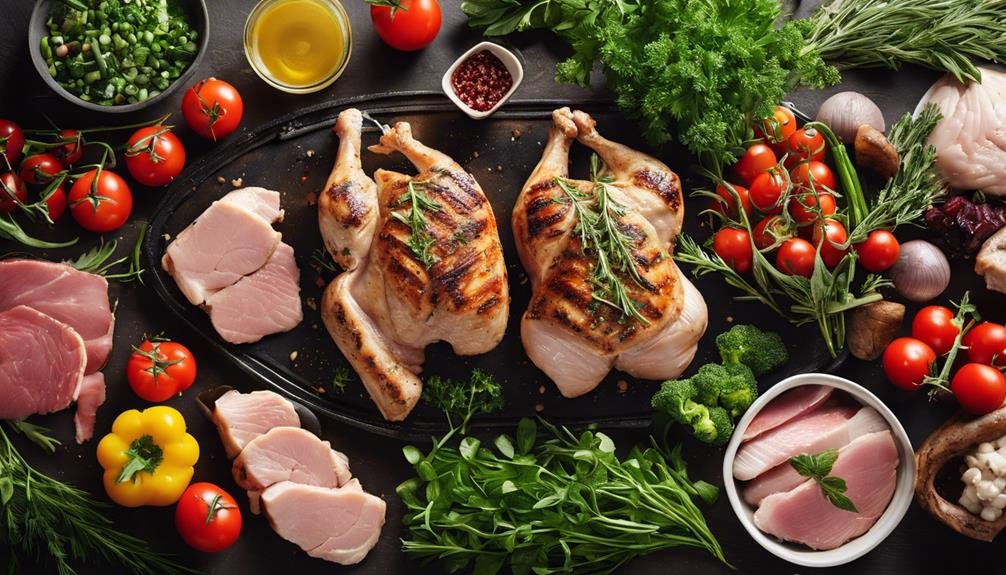
Enhancing your strength and supporting your body's recovery can be achieved through incorporating lean proteins into your diet. Lean proteins, such as poultry, fish, tofu, and legumes, are essential for rebuilding muscle and promoting overall wellness during cancer recovery. These protein sources are rich in amino acids, the building blocks of muscles and tissues, aiding in the repair and regeneration process post-treatment.
Including lean proteins in your meals can help you regain strength, improve energy levels, and support your immune system.
Opt for grilled chicken, baked fish, or lentil soups to ensure a good intake of quality proteins while keeping the fat content low.
Incorporating Healthy Fats
For optimal health and vitality during your cancer recovery journey, it's crucial to incorporate healthy fats into your diet. Healthy fats, such as those found in avocados, nuts, seeds, and olive oil, play a vital role in supporting your body's healing process. These fats are rich in omega-3 fatty acids, which have anti-inflammatory properties that can help reduce inflammation in your body, a common issue during cancer treatment.
Additionally, healthy fats provide a concentrated source of energy, essential for rebuilding tissues and supporting overall strength and immunity.
Including healthy fats in your meals can also help enhance the absorption of fat-soluble vitamins like A, D, E, and K, which are crucial for maintaining optimal health. When choosing fats, opt for whole food sources over processed options to maximize their nutritional benefits.
Healing Properties of Fruits
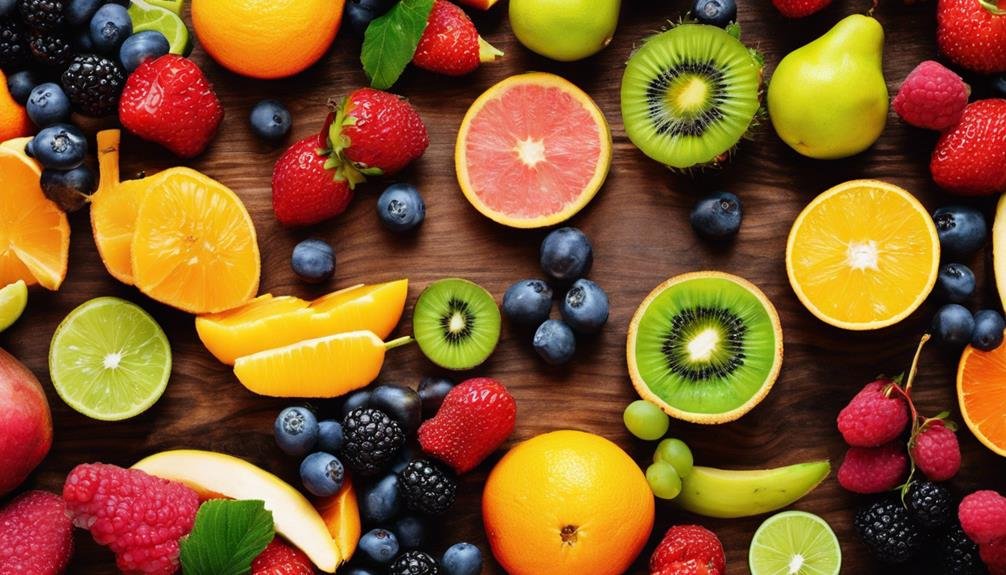
Exploring the healing properties of fruits can be a transformative journey as you navigate your path to cancer recovery. Fruits are nature's gift, packed with essential vitamins, minerals, and antioxidants that support your body's healing process.
Berries, like blueberries and strawberries, are rich in antioxidants that help reduce inflammation and protect cells from damage.
Citrus fruits such as oranges and grapefruits provide a dose of vitamin C, crucial for boosting your immune system during cancer treatment.
Incorporating fruits into your diet can also help maintain a healthy weight, which is vital for cancer recovery. Fruits like apples and pears contain fiber that aids digestion and promotes satiety, preventing unhealthy snacking. Additionally, the natural sugars in fruits provide a sustainable energy source without causing spikes in blood sugar levels.
Embrace the vibrant colors and flavors of fruits to nourish your body and support your journey towards cancer recovery. Including a variety of fruits in your daily meals can be a delicious way to enhance your overall well-being.
Nourishing Vegetables for Vitality
As you continue your journey towards cancer recovery, turning your focus to the nourishing properties of vegetables can provide vital support for your overall well-being. Vegetables are powerhouses of nutrients that can aid in boosting your immune system, reducing inflammation, and supporting your body's healing process.
Dark leafy greens like spinach, kale, and Swiss chard are rich in antioxidants, vitamins, and minerals that can help combat the effects of cancer treatment and promote cellular health.
Cruciferous vegetables such as broccoli, cauliflower, and Brussels sprouts contain compounds that have been shown to have anti-cancer properties and support detoxification pathways in the body.
Brightly colored vegetables like bell peppers, carrots, and sweet potatoes provide essential vitamins and phytonutrients that can enhance your overall vitality.
Balancing Macronutrients
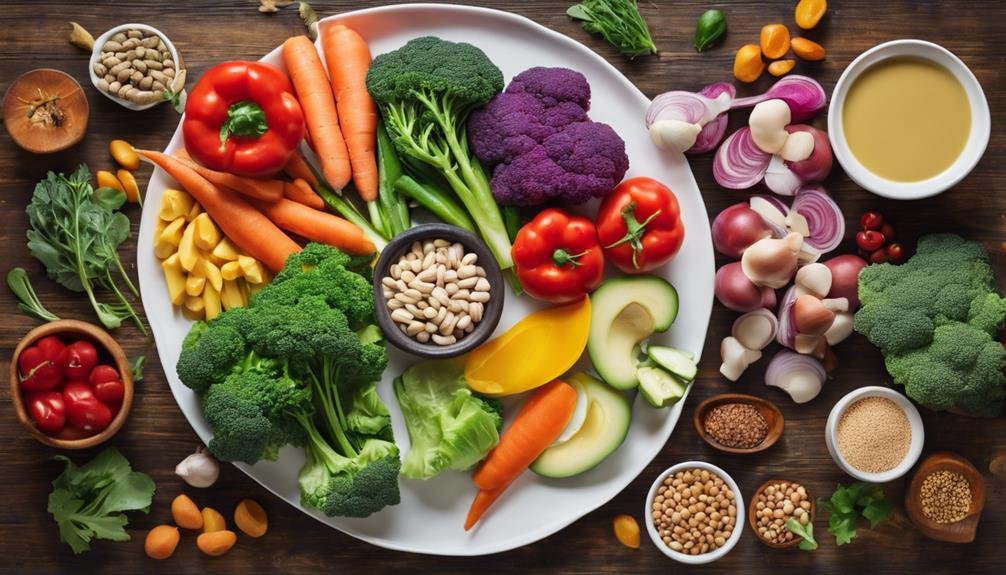
To support your cancer recovery journey effectively, understanding how to balance macronutrients in your diet is crucial. Macronutrients are the essential nutrients your body needs in larger quantities: carbohydrates, proteins, and fats. Each plays a vital role in your overall health and well-being during this challenging time.
Carbohydrates provide energy for your body and brain. Choose complex carbohydrates like fruits, vegetables, and whole grains over refined sugars and processed foods to support stable blood sugar levels.
Proteins are the building blocks for your body's tissues and immune system. Include lean sources like poultry, fish, and legumes to aid in the healing process.
Healthy fats, found in nuts, seeds, avocados, and olive oil, are crucial for cell function and reducing inflammation.
Paleo Diet for Wellness
The Paleo diet, also known as the Paleolithic diet or caveman diet, focuses on consuming foods that our ancestors would have eaten during the Paleolithic era. Embracing the Paleo principles can contribute to your overall wellness in various ways. Here are four key aspects of the Paleo diet for enhancing your well-being:
- Whole Foods: By prioritizing whole foods like lean meats, fish, fruits, and vegetables, you provide your body with essential nutrients for optimal health.
- Elimination of Processed Foods: Cutting out processed foods helps reduce inflammation and supports better digestion and nutrient absorption.
- Healthy Fats: Including sources of healthy fats such as avocados, nuts, and seeds can aid in brain function and provide long-lasting energy.
- Balanced Macronutrients: The Paleo diet naturally promotes a balance of macronutrients, ensuring you get a good mix of protein, healthy fats, and carbohydrates for sustained energy levels throughout the day.
Frequently Asked Questions
Can the Paleo Diet Help Prevent Cancer From Recurring?
Yes, the paleo diet can potentially help prevent cancer recurrence.
By focusing on whole foods like lean proteins, fruits, vegetables, and healthy fats, the paleo diet supports a nutrient-dense and anti-inflammatory eating pattern.
These elements are crucial for overall health and may reduce the risk of cancer returning.
Remember to consult with healthcare professionals for personalized advice and treatment plans tailored to your specific needs and medical history.
Are There Specific Herbs or Supplements Recommended for Cancer Recovery?
Yes, specific herbs and supplements can aid in cancer recovery. Consult with your healthcare provider to determine which ones are safe and effective for you.
Some commonly recommended options include turmeric, green tea extract, and medicinal mushrooms like reishi and maitake. These natural remedies may help support your body's healing process, but it's crucial to integrate them into your treatment plan under professional guidance for optimal results.
How Can Stress Management Support Cancer Recovery?
To support cancer recovery, managing stress is crucial. Picture stress as a heavy cloud over your well-being. By incorporating practices like mindfulness, deep breathing, and gentle exercise, you can disperse this cloud.
Stress reduction boosts immune function, promotes better sleep, and enhances overall resilience during cancer recovery. Remember, taking care of your mental health is just as important as caring for your physical well-being on this journey.
Is Intermittent Fasting Beneficial for Cancer Survivors?
Intermittent fasting may offer benefits for cancer survivors by potentially reducing inflammation, improving insulin sensitivity, and supporting healthy cell function. However, it's essential to consult with your healthcare provider before starting any fasting regimen, as individual needs can vary.
Research suggests that intermittent fasting could complement a well-rounded approach to cancer recovery, but personalized guidance is crucial to ensure it aligns with your overall treatment plan and health goals.
Are There Any Specific Cooking Methods Recommended for Cancer Patients?
When cooking for cancer patients, it's essential to stick to gentle methods like steaming, boiling, or baking. These techniques help retain the nutrients in food while making it easier to digest. Avoid grilling or frying, which can produce harmful compounds.
Keeping it simple and wholesome is key to supporting their recovery journey. Remember, nourishing your loved ones with care and thoughtfulness can make a world of difference in their healing process.
Conclusion
As you continue to embrace the Paleo principles in your journey towards cancer recovery, remember that every meal you choose has the power to support your healing process. By prioritizing whole, nutrient-dense foods and eliminating processed sugars, you are creating a foundation for wellness and vitality. Stay committed to nourishing your body with the healing properties of fruits and vegetables, and maintaining a balanced intake of macronutrients for sustained energy levels. Your body will thank you for the support.
